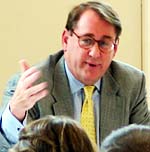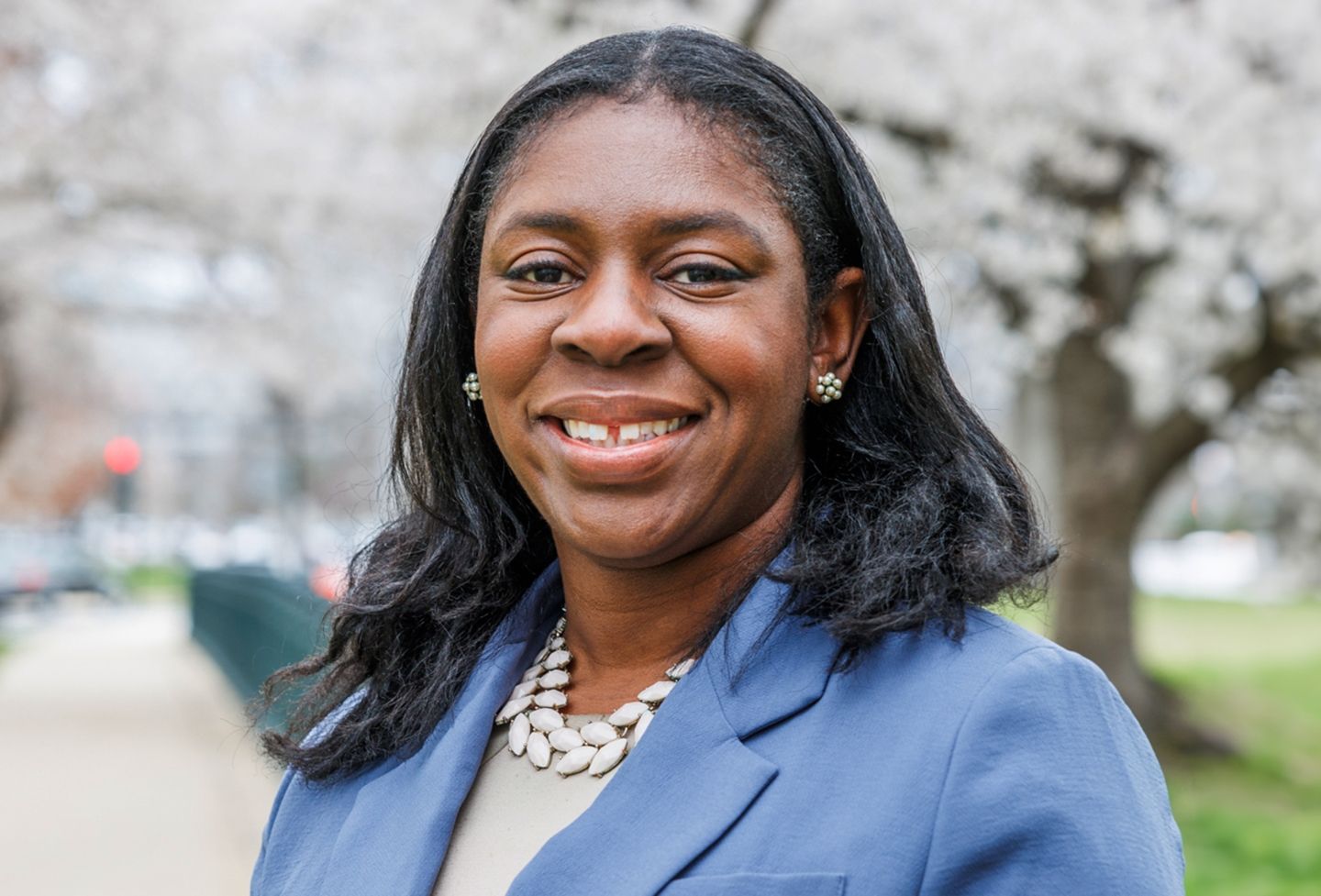Key Rulings from Supreme Court Term Reviewed

Law students and faculty packed into Caplin Pavilion Sept. 3 to hear professors Elizabeth Magill, Stephen Smith, and Law School Dean John Jeffries assess the rulings of the last session of the Supreme Court, a debriefing that customarily launches a new academic year. Panel moderator A.E. Dick Howard opened remarks by sketching out the inclinations of the court, noting that the justices have been together nine years, marking the longest stretch without a change in faces since the early 19th century.
The Rehnquist Court is "so self confident that it is perfectly happy to strike down acts of Congress, even three in one week in 1997," Howard said. "That's fairly heavy lifting by any standard!" The Court is marked by its rediscovery of federalism-"the 10th and 11th Amendments are back in a big way," Howard said-as well as by scaling back traditional doctrine on the wall of separation between church and state. Despite its aversion to race-based remedies, the "center has held" on the court on affirmative action and abortions issues, he said, noting that Justice Sandra Day O'Connor, frequently a swing vote, was the justice least in dissent in the decisions of last year, only five times in all 80 cases.
First Amendment Cases

Commenting on two recent cases decided by the Supreme Court of Virginia, Dean Jeffries said bemusedly that Virginia is in the vanguard of protecting federal rights by striking down Commonwealth laws it said violated the First Amendment. The Supreme Court then overturned those Virginia rulings "on the grounds that they had been too generous in protecting federal rights," Jeffries said.
One of those cases, Virginia v. Hicks, "may be interesting one day, but not yet," he said. In Hicksthe City of Richmond was challenged for "privatizing" a street as a device to stop suspected drug dealers from frequenting it. It gave the street to its public housing authority, which was then able to block nonresidents from loitering by serving them notices that they were unwelcome and not allowed to return. One of those evicted did return and was arrested. He challenged the law as over-broad, as potentially interfering with First Amendment rights, but the Supreme Court upheld it saying that problems may result from the law but it will wait to see if they happen before striking it down. Jeffries said the court saw the privatization of streets as "not yet a mature issue."
The second case, Virginia v. Black, is about cross burning. The Court said it is constitutionally permissible for Virginia to have a law banning cross-burning that is meant to intimidate, but it then struck down a jury instruction that said the act of cross burning is by its nature intimidating. "The court got very excited about that instruction, fractured it about five ways and then said that allowing the jury to infer the intent to intimidate from the act of burning a cross was unconstitutional," Jeffries said.
"Very few people burn crosses for warmth or illumination," he observed. "Throughout our history, crosses have been burned for the purpose of frightening and intimidating people and everyone knows it." For a prosecutor to prove this amounts to "knocking at an open door," he said. "But the main point is that the statute was upheld."
The decision was "fundamentally at odds" with the Court's 1992 decision in RAV v. St. Paul, which struck down a very similar Minnesota ordinance. Five of six justices reversed themselves between the two cases, Jeffries said. "It's an unprecedented wholesale defection from the Supreme Court by the Supreme Court."
He said the court tried to draw a distinction between a law that forbid cross burning when it specified race, creed or gender for the victim (unconstitutional) and the Virginia one that applied universally (constitutional). The distinction ignores the cultural history of cross burning, he said, which is clearly about race and religion.
The justices who changed their minds did so because of a passionate speech by Justice Clarence Thomas, which was all the more powerful because he rarely speaks from the bench during oral argument, Jeffries said. Thomas "erupted from the bench," he said, and took lawyers to task for not sufficiently expressing the meaning of cross burning, which Thomas called a "terrorist act" that was part of a reign of terror and, further, that it deserved no constitutional protection. "I think this is a case where a constitutional issue turned on a dime because of an emphatic, emotional message from a justice whose race gave him particular authority and resonance," Jeffries concluded.

Criminal Procedure Rulings
The Court was "true to its law-and-order instincts, in most cases," said Professor Stephen Smith in describing the Court's rulings on cases affecting criminal procedure. Generally, the Court declined to enlarge the rights of criminal defendants, he said, but they nonetheless won some victories.
"The Court has a particular vision of the criminal justice system and that the main purpose of constitutional review of criminal convictions is not to promote 'fairness' for defendants, but to have an accurate system for adjudicating the guilt or innocence of suspects," Smith said.
The most noteworthy case in which the Court sided with the prosecution was Ewing v. California, said Smith. Under California's three-strikes law, felony convictions followed by any third crime results in a mandatory sentence. Ewing had two strikes on his record when he stole three golf clubs, "hobbling out of the store with them stuffed down his pants leg," and in a companion case the suspect stole videos of Cinderella and Snow White. Both cases resulted in mandatory 25-years-to-life sentences, which the defendants appealed as too harsh for the petty crimes they had committed and violated the constitutional protection against cruel and unusual punishment.
The Court upheld the sentence on the grounds that the state has a legitimate interest in curbing repeat offenders and that, short of the death sentence, the Eighth Amendment says nothing about proportionality.
Another win for prosecutors, Smith said, concerned "Megan's laws," which require people convicted of sex crimes to register with the government and have their names, pictures, and addresses posted on the Internet. Naturally, criminals don't like this publicity and the laws were challenged on due process and ex post factogrounds. The court upheld the state in both cases, saying there was no argument over the fact of the convictions and that in publishing a fact the state was not further punishing the offenders.
Smith also mentioned the Maryland case of Wiggins v. Smith, in which a death sentence was overturned because of incompetent representation of the defendant. Defense counsel offered no mitigating factors nor made other efforts to save the life of his client. Juries are generally reluctant to impose capital punishment and will give life sentences if they have an excuse to, Smith explained.

University of Michigan Affirmative Action Cases
"The main punch line is that the Court said that selective institutions can rely on race to put together a diverse class if they do so in narrowly tailored way," said Elizabeth Magill to sum up the court's ruling on the University of Michigan affirmative action cases, which she called the most high-profile cases of the last term. In revisiting the issues of the 1992 Bakkecase, the question in the Michigan cases turned on whether a forward-looking rationale, not one that attempts to remedy prior discrimination — namely the goal of diverse viewpoints in a class — could be used to justify using race as a factor in selecting a class.
The procedure for selecting students has to be narrowly tailored, the Court said, and cannot resort to quotas. Both Michigan schools have the same diversity goal, but the law school's application process, which assigned no objective value to race, passed muster, while its undergraduate colleague did not since its procedure used a 150-point system that granted 20 points to minority students.
Magill said the reason for the difference in systems is the difference in the demand on them, with the law school handling thousands of applications and the undergraduate school handling tens of thousands and therefore needing more explicit administrative policies to ensure fair consideration of applicants. "The head of admissions wants to control what his admissions officers are doing so he has an objective criteria, making sure they aren't off on a lark admitting whoever they feel like," Magill explained.
"The surprising news is that there is a lot of agreement in the opinions," Magill said. "The majority of the court embraces the diversity justification." Only justices Antonin Scalia and Clarence Thomas were unconvinced, insisting that race should never be used as a selection factor, she said. Magill called Thomas' dissent "provocative and memorable." He argues that on balance affirmative action actually harms its beneficiaries and stigmatizes African Americans.
Magill also mentioned Lawrence v. Texasas a watershed in gay rights. In it the Court abandoned the position it took in its 1986 Bowers v. Hardwickruling, in which it had said that states can pass laws against homosexual acts. "The world has unquestionably changed," Magill said. "Gay behavior is no longer criminalized."
Founded in 1819, the University of Virginia School of Law is the second-oldest continuously operating law school in the nation. Consistently ranked among the top law schools, Virginia is a world-renowned training ground for distinguished lawyers and public servants, instilling in them a commitment to leadership, integrity and community service.


